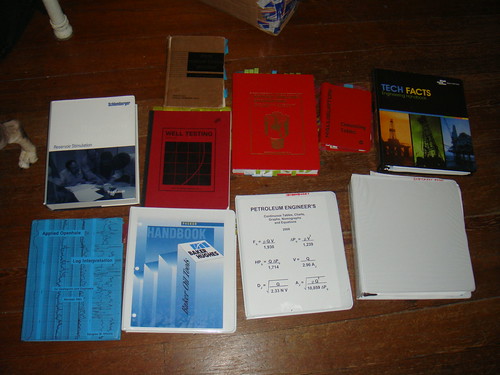After all this studying, then what? The P.E. Exam will allow me to stamp drawings (taking on liability for any errors) or work on my own. Even the later is subject so all sorts of caveats. For example, the state of Louisiana prohibits offering engineering services without a license (P.E.), but does allow for the much-maligned "industrial exemption".
Anyway, the P.E. is very important with what I do, but for other industries, the P.E. is useless. I've chatted with a few of my coworkers that work in aerospace, and their companies are all about the Master's degrees, especially if you deal directly with NASA. The NASA employees look down their nose at an engineer that just has an undergrad degree.
Just throwing out random additional ideas:
* Petroleum Engineering/Geology

Petroleum Engineering textbook set I picked up
When times are good, Petroleum Engineering is the highest paying of all engineering professions (when times are not so good, they all go on the unemployment line). I've got the SPE Guide to the P.E. Exam and it seems about 1/3 production system (which I know), 1/3 reservoir engineering (mostly geology), and 1/3 drilling. Now, normally someone who works on drilling would never work on production and visa-versa, but BP has taught me a whole lot about drilling.
* Naval Architecture/Marine Engineering. Recently, I've been working on a lot of offshore and marine systems (ballast systems and the like) and I've found it pretty interesting. If I were to pick up the requesite undergraduate courses, UNO happens to have one of the best NAME programs in the country. Maybe I should look into getting a degree before the Legislature's budget cuts make UNO "ain't dere no more."
* Nuclear. Nukes have always been fascinating to me. It's 20% of our electricity comes from nukes and we actually produce more power, GW(e) to GW(e), than France. I've picked up a guide to the nuclear P.E. test as well.
* Materials Science. There's always a need for a "materials/corrosion guy" on all large projects. An extensive knowledge of materials, galvanic corrosion, welding, etc. It also is a nice balance between specialization and generalization. I don't like the idea of doing just one little niche with no idea on how it fits into the total project. One cool resource: the entire ASM Metals handbook is now online.
No comments:
Post a Comment